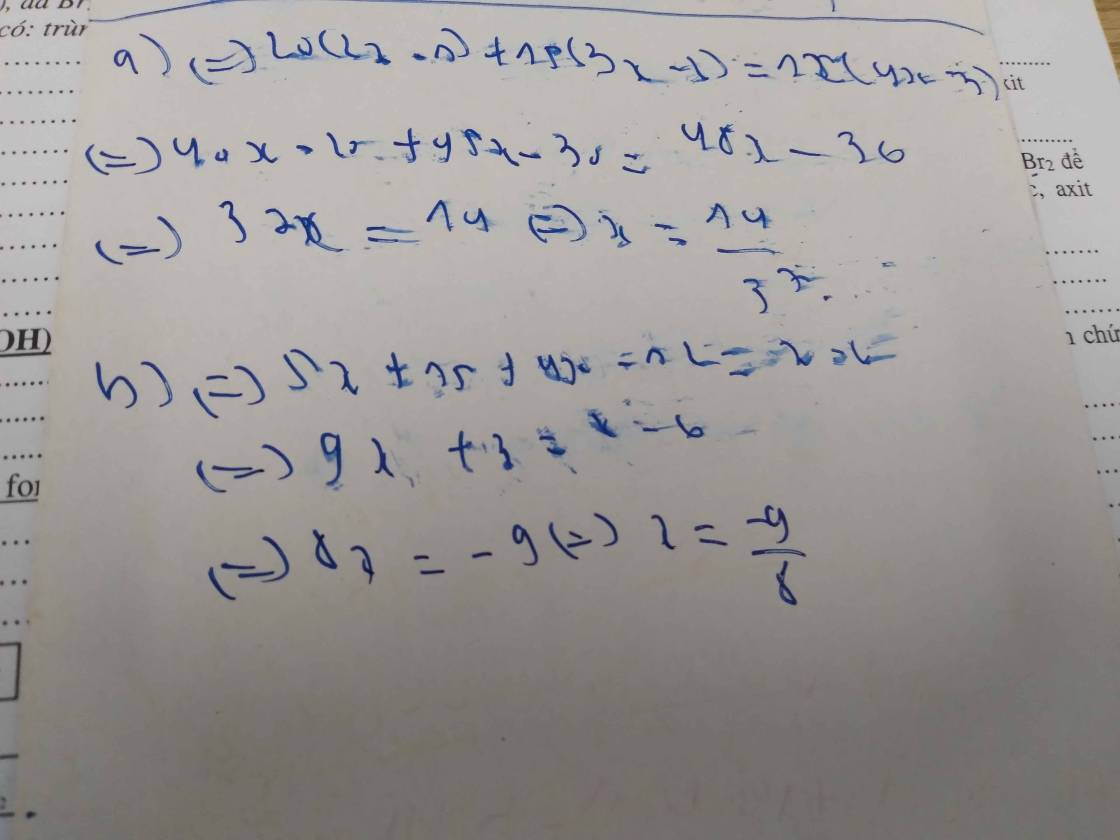Hãy nhập câu hỏi của bạn vào đây, nếu là tài khoản VIP, bạn sẽ được ưu tiên trả lời.

Bài 1: Giải các phương trình sau:
a) 3(2,2-0,3x)=2,6 + (0,1x-4)
<=> 6.6 - 0.9x = 2,6 + 0,1x - 4
<=> - 0.9x - 0,1x = -6.6 -1,4
<=> -x = -8
<=> x = 8
Vậy x = 8
b) 3,6 -0,5 (2x+1) = x - 0,25(22-4x)
<=> 3,6 - x - 0,5 = x - 5,5 + x
<=> - x - 3,1 = -5,5
<=> - x = -2.4
<=> x = 2.4
Vậy x = 2.4

a: =>3,6-1,7x=2,3-1,4-4=0,9-4=-3,1
=>1,7x=6,7
hay x=67/17
b: \(\Leftrightarrow30\left(5x+4\right)-15\left(3x+5\right)=24\left(4x+9\right)-40\left(x-9\right)\)
=>150x+120-45x-75=96x+216-40x+360
=>105x+45=56x+576
=>49x=531
hay x=531/49

\(a,\Leftrightarrow\left(x-2\right)\left(2x+5\right)=0\\ \Leftrightarrow\left\{{}\begin{matrix}x-2=0\\2x+5=0\end{matrix}\right.\\ \Leftrightarrow\left\{{}\begin{matrix}x=2\\x=\dfrac{5}{2}\end{matrix}\right.\)
Vậy phương trình có tập nghiệm S = \(\left\{2;\dfrac{5}{2}\right\}\)
\(c,\Leftrightarrow2x.\left(x+1\right)-x.\left(x-1\right)=\left(x-1\right)\left(x+1\right)\) ( ĐKXĐ: \(x\ne-1;x\ne1\) )
\(\Leftrightarrow2x^2+2x-x^2+x=x^2-1\\ \Leftrightarrow x^2-x^2+3x=-1\\ \Leftrightarrow3x=-1\\ \Leftrightarrow x=-\dfrac{1}{3}\) ( nhận )
Vậy phương trình có tập nghiệm S = \(\left\{-\dfrac{1}{3}\right\}\)

\(1,\dfrac{4x-4}{3}=\dfrac{7-x}{5}\\ \Leftrightarrow5\left(4x-4\right)=3\left(7-x\right)\\ \Leftrightarrow20x-20=21-3x\\ \Leftrightarrow17x=41\Leftrightarrow x=\dfrac{41}{17}\)
\(2,\dfrac{3x-9}{5}=\dfrac{3-x}{2}\\ \Leftrightarrow6x-18=15-5x\\ \Leftrightarrow11x=33\\ \Leftrightarrow x=3\)
\(3,\dfrac{2x-1}{5}-\dfrac{3-x}{3}=1\\ \Leftrightarrow\dfrac{6x-3-15+5x}{15}=1\\ \Leftrightarrow11x-18=1\\ \Leftrightarrow x=\dfrac{19}{11}\)
\(4,\dfrac{x-5}{3}+\dfrac{3x+4}{2}=\dfrac{5x+2}{6}\\ \Leftrightarrow2x-10+9x+12=5x+2\\ \Leftrightarrow6x=0\Leftrightarrow x=0\)
\(5,\dfrac{x-3}{2}+\dfrac{2x+3}{5}=\dfrac{2x+5}{10}\\ \Leftrightarrow5x-15+4x+6=2x+5\\ \Leftrightarrow7x=14\\ \Leftrightarrow x=2\)
Tick nha
2: Ta có: \(\dfrac{3x-9}{5}=\dfrac{3-x}{2}\)
\(\Leftrightarrow6x-18=15-5x\)
\(\Leftrightarrow11x=33\)
hay x=3

\(\dfrac{2x-1}{3}+\dfrac{3x-2}{4}=\dfrac{4x-3}{5}\)
\(\Leftrightarrow\dfrac{20\left(2x-1\right)}{60}+\dfrac{15\left(3x-2\right)}{60}=\dfrac{12\left(4x-3\right)}{60}\)
`<=> 20(2x-1) +15(3x-2) =12(4x-3)`
`<=> 40x - 20 + 45x - 30 = 48x - 36`
`<=> 85x -50 = 48x - 36`
`<=> 85x-48x = -36+50`
`<=> 37x =14`
`<=> x= 14/37`
Vậy phương trình có nghiệm `x=14/37`
__
\(\dfrac{5}{x-3}+\dfrac{4}{x+3}=\dfrac{x-6}{x^2-9}\)
\(\Leftrightarrow\dfrac{5}{x-3}+\dfrac{4}{x+3}=\dfrac{x-6}{\left(x-3\right)\left(x+3\right)}\)
ĐKXĐ : \(\left\{{}\begin{matrix}x-3\ne0\\x+3\ne0\end{matrix}\right.\Leftrightarrow\left\{{}\begin{matrix}x\ne3\\x\ne-3\end{matrix}\right.\)
Ta có : \(\dfrac{5}{x-3}+\dfrac{4}{x+3}=\dfrac{x-6}{\left(x-3\right)\left(x+3\right)}\)
\(\Leftrightarrow\dfrac{5\left(x+3\right)}{\left(x-3\right)\left(x+3\right)}+\dfrac{4\left(x-3\right)}{\left(x+3\right)\left(x-3\right)}=\dfrac{x-6}{\left(x-3\right)\left(x+3\right)}\)
`=> 5x + 15 + 4x -12=x-6`
`<=> 9x + 3=x-6`
`<=> 9x-x=-6-3`
`<=> 8x = -9`
`<=>x=-9/8(tm)`
Vậy phương trình có nghiệm `x=-9/8`
` @ yngoc`

g.\(\dfrac{1-3x}{6}+x-1=\dfrac{x+2}{2}\)
\(\Leftrightarrow\dfrac{\left(1-3x\right)+6\left(x-1\right)}{6}=\dfrac{3\left(x+2\right)}{6}\)
\(\Leftrightarrow\left(1-3x\right)+6\left(x-1\right)=3\left(x+2\right)\)
\(\Leftrightarrow1-3x+6x-6=3x+6\)
\(\Leftrightarrow-5=6\left(vô.lí\right)\)
Vậy pt vô nghiệm
h.\(\dfrac{3\left(2x+1\right)}{4}-5-\dfrac{3x+2}{10}=\dfrac{2\left(3x-1\right)}{5}\)
\(\Leftrightarrow\dfrac{15\left(2x+1\right)-100-2\left(3x+2\right)}{20}=\dfrac{8\left(3x-1\right)}{20}\)
\(\Leftrightarrow15\left(2x+1\right)-100-2\left(3x+2\right)=8\left(3x-1\right)\)
\(\Leftrightarrow30x+15-100-6x-4=24x-8\)
\(\Leftrightarrow-89=-8\left(vô.lí\right)\)
Vậy pt vô nghiệm

a) ĐKXĐ: \(x\ne0\)
Ta có: \(\dfrac{1}{3x}+\dfrac{1}{2x}=\dfrac{1}{4}\)
\(\Leftrightarrow\dfrac{4}{12x}+\dfrac{6}{12x}=\dfrac{3x}{12x}\)
Suy ra: \(3x=10\)
\(\Leftrightarrow x=\dfrac{10}{3}\)(thỏa ĐK)
Vậy: \(S=\left\{\dfrac{10}{3}\right\}\)
b) ĐKXĐ: \(x\ne0\)
Ta có: \(\dfrac{3}{8x}-\dfrac{1}{2x}=\dfrac{1}{x^2}\)
\(\Leftrightarrow\dfrac{3x}{8x^2}-\dfrac{4x}{8x^2}=\dfrac{8}{8x^2}\)
Suy ra: \(3x-4x=8\)
\(\Leftrightarrow-x=8\)
hay x=-8(thỏa ĐK)
Vậy: S={-8}
c)ĐKXĐ: \(x\ne0\)
Ta có: \(\dfrac{1}{2x}+\dfrac{3}{4x}=\dfrac{5}{2x^2}\)
\(\Leftrightarrow\dfrac{2x}{4x^2}+\dfrac{3x}{4x^2}=\dfrac{10}{4x^2}\)
Suy ra: 2x+3x=10
\(\Leftrightarrow5x=10\)
hay x=2(thỏa ĐK)
Vậy: S={2}
d, \(\dfrac{2a}{x+a}=1\) (x \(\ne\) -a)
\(\Leftrightarrow\) \(\dfrac{2a}{x+a}-\dfrac{x+a}{x+a}=0\)
\(\Leftrightarrow\) \(\dfrac{a-x}{x+a}=0\)
\(\Leftrightarrow\) a - x = 0 (x + a \(\ne\) 0)
\(\Leftrightarrow\) x = a (TM)
Vậy S = {a}
Chúc bn học tốt!

1a.
ĐKXĐ: \(x\ne\left\{1;3\right\}\)
\(\Leftrightarrow\dfrac{6}{x-1}=\dfrac{4}{x-3}+\dfrac{4}{x-3}\)
\(\Leftrightarrow\dfrac{3}{x-1}=\dfrac{4}{x-3}\Leftrightarrow3\left(x-3\right)=4\left(x-1\right)\)
\(\Leftrightarrow3x-9=4x-4\Rightarrow x=-5\)
b.
ĐKXĐ: \(x\ne\left\{-1;2\right\}\)
\(\Leftrightarrow\dfrac{5}{x+1}=\dfrac{3}{2-x}+\dfrac{1}{2-x}\)
\(\Leftrightarrow\dfrac{5}{x+1}=\dfrac{4}{2-x}\Leftrightarrow5\left(2-x\right)=4\left(x+1\right)\)
\(\Leftrightarrow10-2x=4x+4\Leftrightarrow6x=6\Rightarrow x=1\)
1c.
ĐKXĐ: \(x\ne\left\{2;5\right\}\)
\(\Leftrightarrow\dfrac{3x\left(x-5\right)}{\left(x-2\right)\left(x-5\right)}-\dfrac{x\left(x-2\right)}{\left(x-2\right)\left(x-5\right)}=\dfrac{-3x}{\left(x-2\right)\left(x-5\right)}\)
\(\Leftrightarrow3x\left(x-5\right)-x\left(x-2\right)=-3x\)
\(\Leftrightarrow2x^2-10x=0\Leftrightarrow2x\left(x-5\right)=0\Rightarrow\left[{}\begin{matrix}x=0\\x=5\left(loại\right)\end{matrix}\right.\)
2a.
\(\Leftrightarrow-4x^2-5x+6=x^2+4x+4\)
\(\Leftrightarrow5x^2+9x-2=0\Rightarrow\left[{}\begin{matrix}x=-2\\x=\dfrac{1}{5}\end{matrix}\right.\)
2b.
\(2x^2-6x+1=0\Rightarrow x=\dfrac{3\pm\sqrt{7}}{2}\)

a) Ta có: \(2\left(3x+1\right)-4\left(5-2x\right)>2\left(4x-3\right)-6\)
\(\Leftrightarrow6x+2-20+8x>8x-6-6\)
\(\Leftrightarrow14x-18-8x+12>0\)
\(\Leftrightarrow6x-6>0\)
\(\Leftrightarrow6x>6\)
hay x>1
Vậy: S={x|x>1}
b) Ta có: \(9x^2-3\left(10x-1\right)< \left(3x-5\right)^2-21\)
\(\Leftrightarrow9x^2-30x+3< 9x^2-30x+25-21\)
\(\Leftrightarrow9x^2-30x+3-9x^2+30x-4< 0\)
\(\Leftrightarrow-1< 0\)(luôn đúng)
Vậy: S={x|\(x\in R\)}